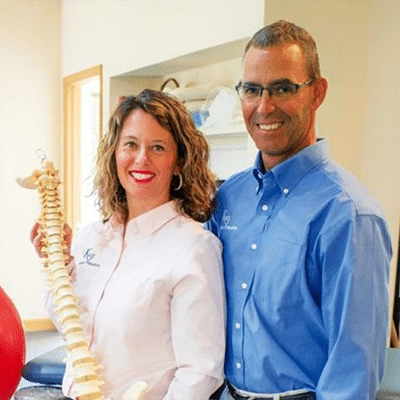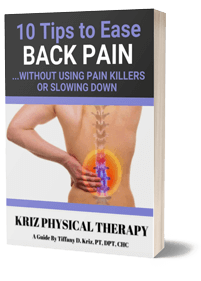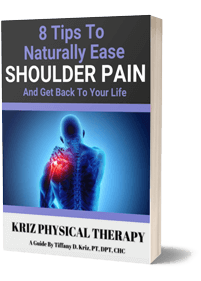
If you’ve been battling shoulder pain for weeks (or months), praying that it will magically heal itself, or you’re sick of being told to rest and take medication…
And you’re fed up with those agonising shooting pains whenever you are carrying the shopping, playing with the grandchildren or exercising.
This blog will explain how to treat rotator cuff injury.
We have some expert advice and practical tips as well as a simple exercise to fix this common shoulder problem and how to avoid it coming back in future.
Plus, we give you a natural way to ease shoulder pain that you can do at home if you are suffering right now!
The Most Common Shoulder Problem – Rotator Cuff Injury
In our clinic, the most common shoulder problem would be a rotator cuff injury. These injuries are usually caused by trauma incidents such as a road traffic accident or a fall.
Another increasingly common cause is due to people being sat in a slouched posture at home for much longer periods of time which places repetitive strain on the muscles and tendons within the shoulder region.
Do I Have A Rotator Cuff Injury?
It is difficult to tell the root cause of your shoulder pain, but there are some common symptoms that suggest a rotator cuff injury.
The first sign of a rotator cuff injury is if the pain occurs when the arm is raised above shoulder height (either in front of you, or to the side).
You may do this when you are lifting grocery shopping into the boot of the car, or taking things out of cupboards in your kitchen.
Another sign of a rotator cuff injury is a sharp pain when you are reaching behind you. You may experience this when you are reaching for something in the back seat of the car, whilst facing forward.
You may also feel pain when pouring a cup of coffee, or getting dressed in the morning as your shoulder is moving, and rotating.
These shoulder positions will be painful because the tendons in the shoulder are being pinched by the joint. This causes discomfort (sometimes severe discomfort), and could lead to fraying or tearing of the muscles surrounding the shoulder joint.
Other symptoms of a rotator cuff injury could be weakness in the shoulder, difficulty moving your shoulder and upper arm, and an increasing pain when laying on the affected shoulder.
Shoulder Exercise To Help Avoid Rotator Cuff Injury
If you are suffering with shoulder pain caused by a rotator cuff injury, it may be beneficial to improve the strength and stability of the shoulder joint.
To avoid making the pain any worse, we would recommend avoiding any heavy, and repetitive overhead movements (you don’t have to stop them entirely, but too much could be a cause of the pain).
To help reduce pain and avoid rotator cuff problems returning in future, you should keep the shoulder joint moving frequently, as this helps the joint stay mobile, nourished and slows down the degenerative aging process.
An exercises that is very effective for our patients with rotator cuff injury and shoulder pain are:
Exercise – Pendulum Swings
This is a simple exercise that you can perform at home. Aim to do this exercise 3 times a day, for around 6-10 minutes each time, changing direction after 1 minute of rotation.
- To begin, lean over a table or chair supporting yourself with your good arm
- Relax your affected arm allowing it to hang
- Genty and slowely swing the arm in a circle by moving your body
- Next move swing your arm forwards and backwards by moving your body
- Finally, swing your arm from side to side
When you are performing this exercise, avoid actively lifting or moving your arm with your shoulder muscles. This should not create any significant pain, but if it does, stop immediately.
Using an exercises like this as part of a tailored exercise plan helps to ensure that the muscles that hold the shoulder in place strong, and reduces the chance of issues in the future.
A Natural Way To Treat Shoulder Pain Caused By A Rotator Cuff Injury
A lot of patients in our clinics want to ease shoulder pain WITHOUT painkillers because they are concerned about the impact of strong painkillers on their health.
A non-medicinal solution to discomfort is to use an ice pack (or a pack of frozen peas) on the affected area. This is a easy, but effective way to ease shoulder pain caused by a rotator cuff injury.
If you try this, make sure to wrap the ice pack in a towel so it’s not in direct contact with your skin.
You can do this for up to 15 minutes at a time, and it can be done several times a day. A good rule of thumb is to allow the area to warm up and return to normal temperature before applying another ice pack.
The Most Effective Way To Treat Rotator Cuff Injury And Shoulder Pain
The best way to get the natural pain relief, and long term results for your rotator cuff injury is to speak to a professional.
Our specialist physical therapists have worked with thousands of patients who wanted a speedy recovery from injury and to get back to doing what they love without painkillers, surgery or injections.
If you are frustrated that your shoulder pain won’t go away, and annoyed that the only advice you’ve received from your doctor is to “rest and take painkillers”, physical therapy is the perfect solution for you.
Reach out to Kriz Physical Therapy, P.A.and arrange a free discovery visit where you can speak to a member of the team and understand the quickest route to a full recovery.
Scheduling with us is quick and easy.
Plus, our therapy sessions are flexible, making us ideal for anyone who manages a busy schedule.
Call our offices today at 239-992-6700 to schedule an appointment or arrange a free discovery visit.
More Natural Ways To Treat Rotator Cuff Injury
At Kriz Physical Therapy, P.A., we have a variety of other natural ways to relieve shoulder problems, for FREE, which you can access online, or by visiting one of our four north east clinics.
Grab a copy of our free Downloadable Shoulder Pain Report written by our founder, Michael Kriz, which explains simple strategies to ease shoulder pain.
You can also read our other popular blogs such as: Joint Pain in the Cold: Three Theories Behind Winter Joint Pain or How To Adapt Your Exercise For Colder Weather
On social media? Head to our Kriz Therapy Facebook Page or Kriz Therapy Instagram Page and follow us for regular tips and advice.




